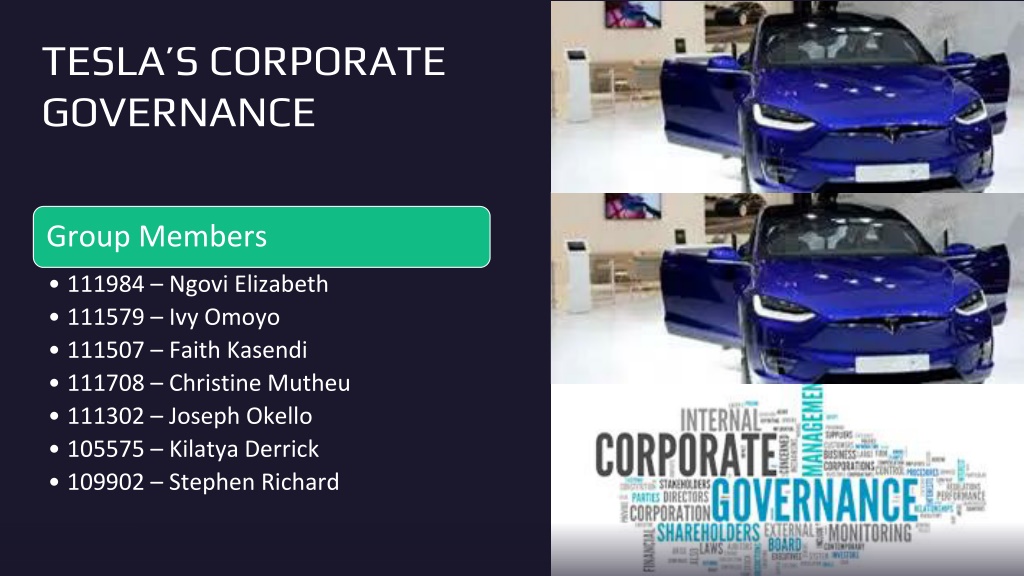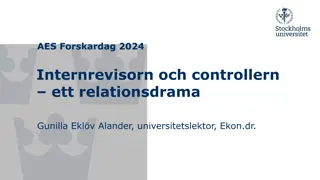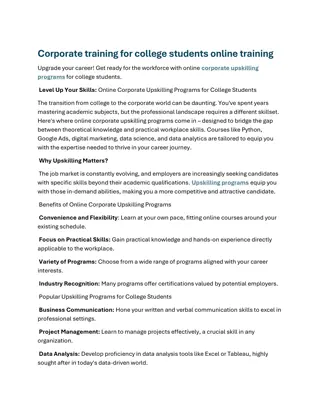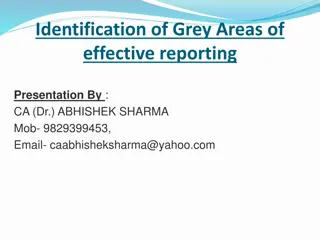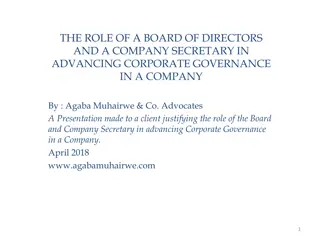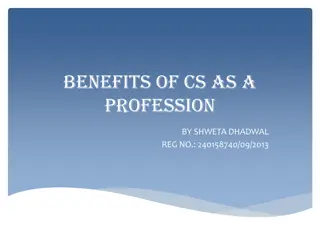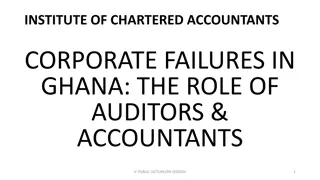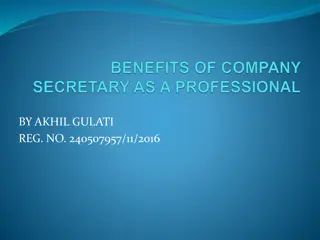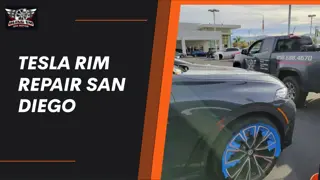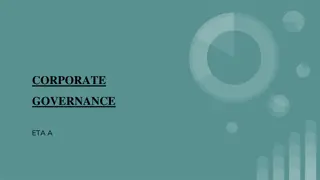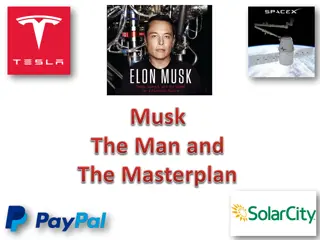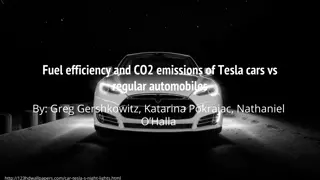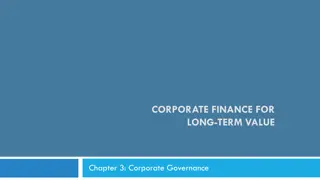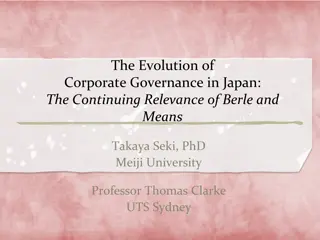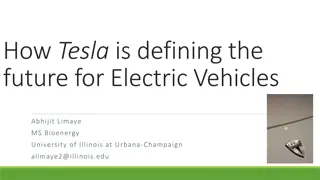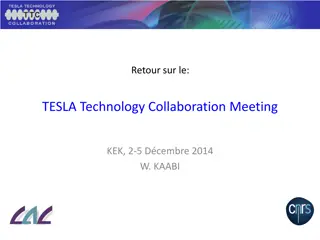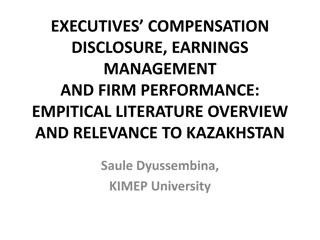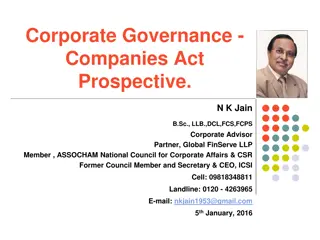Tesla's Corporate Governance Overview
Tesla's corporate governance focuses on a system of rules and practices that direct and control the company. This includes defining power, accountability, decision-making roles, and potential conflicts of interest within the board of directors. Key issues discussed involve conflicts of interest, segregation of duties, governance structure, sustainability, and director independence. Solutions like adding independent board members and promoting safety initiatives are highlighted to enhance governance effectiveness.
Download Presentation

Please find below an Image/Link to download the presentation.
The content on the website is provided AS IS for your information and personal use only. It may not be sold, licensed, or shared on other websites without obtaining consent from the author.If you encounter any issues during the download, it is possible that the publisher has removed the file from their server.
You are allowed to download the files provided on this website for personal or commercial use, subject to the condition that they are used lawfully. All files are the property of their respective owners.
The content on the website is provided AS IS for your information and personal use only. It may not be sold, licensed, or shared on other websites without obtaining consent from the author.
E N D
Presentation Transcript
TESLAS CORPORATE GOVERNANCE Group Members 111984 Ngovi Elizabeth 111579 Ivy Omoyo 111507 Faith Kasendi 111708 Christine Mutheu 111302 Joseph Okello 105575 Kilatya Derrick 109902 Stephen Richard
Corporate Governance Definition. Corporate governance is a system of rules, practices and processes by which a company is directed and controlled. It refers to the way in which companies are governed and identifies who has power and accountability and who makes decisions. Tuesday, February 2, 20XX Sample Footer Text 2
Issues in Teslas Corporate Governance CONFLICT OF INTEREST Musk's August 13 blog post was the first time Musk made a statement as a potential buyer of Tesla, but if true, Tesla's board should not have authorized him to speak to key shareholders at this stage (which we learned they did in the same blog post). If Musk were a serious potential buyer, he would be on both sides of a potential transaction: as the current CEO, Chairman, and a significant shareholder of the company versus as the potential buyer of the company. This is a conflict of interest, including under Tesla's Code of Business Conduct and Ethics. Tuesday, February 2, 20XX Sample Footer Text 3
Cont. SEGREGATION OF DUTIES GOVERNANCE STRUCTURE Tesla s Board of Directors has 9 members who are responsible for setting standards for the Company s stakeholders. It is their duty to serve as prudent fiduciaries for shareholders and to oversee the management of the Company's business. Some of Tesla s board members have other duties within the company which leads to the threatening of their independence as they make decisions considering their other duties. Solution: Tesla added 2 independent board members who have no previous business or personal ties with the CEO. To discharge this duty, the Board of Directors follow the procedures and standards that are set which are subject to modification regularly as the Board of Directors deems appropriate in the best interests of the Company . Tuesday, February 2, 20XX Sample Footer Text 4
Cont. SUSTAINABILITY DIRECTORS INDEPENDENCE Taking a proactive approach to safety by requiring production employees to participate in a multi-day training program before going to the factory floor, Tesla also continues to provide on- the-job training and track performance daily so that improvements can be made quickly. This increases Tesla s safety rate while production ramps. Tesla wouldn't comment about its directors, and members reached did not return messages. But the company pointed to its proxy statement that said seven of nine members are considered independent based on standards set by the Nasdaq stock market, on which Tesla stock trades. Tesla also has a Gigafactory 1, a facility designed to reduce battery cell costs and support its automotive and energy products by bringing cell production in-house, Tesla manufactures batteries at the volumes required to meet production goals, while creating thousands of jobs Tuesday, February 2, 20XX Sample Footer Text 5
Cont. CONTROL Regarding public statements, Tesla was sued for online comments made by CEO Musk about a possibly taking the publicly traded company private. Tesla was sued for charges that the post misled investors. It led to Tesla and Musk each paying a civil penalty of 20 million dollars. Solution: Tesla appointed two additional independent directors and created a permanent board committee of independent directors charged with overseeing controls governing public statements. The company enhanced controls with Musk s public communications regarding Tesla and to pre- approve any written communications that contain or reasonably could contain information material to Tesla or its stockholders. Tuesday, February 2, 20XX Sample Footer Text 6
Thank You ! Tuesday, February 2, 20XX Sample Footer Text 7
